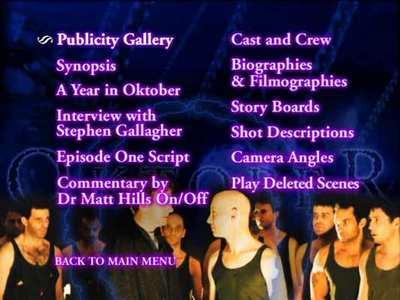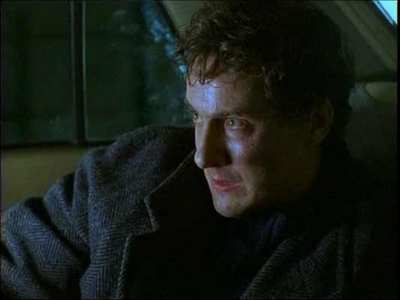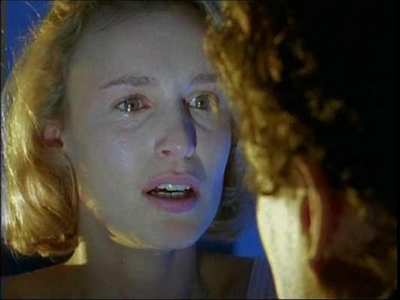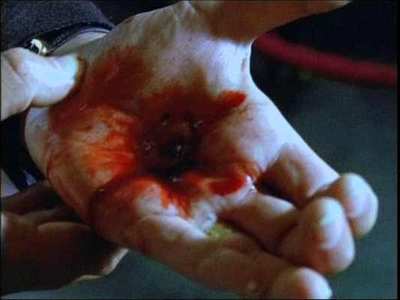Review of Oktober
Introduction
Someone please spare me from the British X-Files. It`s been the Holy Grail for British television producers ever since the American show debuted on the BBC. The X-Files` then unique blend of paranormal drama and conspiracy theory intrigue drew an immediate cult audience, and that is something that British television has been seeking ever since the demise of Dr Who. Even when the X-Files went off the boil and its copycats fell by the wayside, British television remained resolute in its search for a homegrown `homage`. It`s a search that still goes on, as in last year`s effort from the BBC, Strange. These are shows that I tend to avoid, as one thing that British television drama usually makes a horrendous balls up of, it`s aping US product. It`s not simply a matter of budget or production values. I`ve found that British sensibilities just don`t translate well to grand American ideals. So when Oktober was shown on ITV a few years ago, I paid it little mind. Indeed the tagline of "Somewhere Between Science And The Paranormal" just says X-Files and as such it was a programme that just wouldn`t appeal to me. It was a misapprehension though, as Oktober only superficially has a tinge of the X-Files about it, and in style bears greater resemblance to the Harrison Ford movie, The Fugitive. The story is presented in 3 episodes on this disc, though you have the option to watch them all in one go.
Jim Harper is a teacher to the children of the world`s rich. Working in Switzerland, he spends terms teaching the joys of English literature, and holidays as a live-in tutor. It was during one holiday that he met and became infatuated with Rochelle Genoud. In return for a lenient mark, Rochelle`s younger brother gives Harper a pass to a mountaintop meeting where he can meet Rochelle, and Harper gladly accepts. But Rochelle runs a rather morally dubious pharmaceuticals company, one that has been doing illicit research into a drug with amazing properties, with comatose Russian pilots as guinea pigs. Stumbling into a laboratory he shouldn`t be in Harper is accosted by security, and ends up injected with the drug, Mentazone. Unlike the Russians though, he stays conscious, and manages to escape from the medical facility. Paranoid that he is being pursued, Harper manages to return to England, but the drug has started to take effect, and he becomes plagued by strange visions and shared dreams. But Rochelle is unwilling to let her most successful test case go, and Harper`s safe haven isn`t all it appears to be. Meanwhile Mentazone is rushing towards clinical trials and large-scale production.

Video
The picture on this Region 0 DVD is a 4:3 regular transfer. This is disappointing to say the least as it was originally shot in anamorphic widescreen. There are only a few places where cropping becomes an issue with characters cut off. But still, given the Geneva locations and the wonderful landscapes of the Alps, this is a missed opportunity. The picture itself is like any other television drama of the period. It`s all clear and sharp enough, if a little grainy and if the colours appear muted, it`s no less than any other British television production. There are moments where the exposure levels a little high, with glaring whites dominating in a couple of scenes, but this seemed more a stylistic decision.

Audio
The sound is a simple DD 2.0 soundtrack and the dialogue is clear throughout. Alan Parker`s music is suitably spooky and ominous, and suits the programme well, however that main theme is certainly repetitive, especially given that it is covers the menu screens. Unfortunately there are no subtitles on the disc.

Features
This disc gets off on the wrong foot, with a scrolling warning stating the copyright of this "videocassette". Fortunately some more care and thought has gone into the extras on the disc, beginning with the subtly understated animated menus.
The commentary on this disc comes from Dr Matt Hills, an academic who is researching the work of Stephen Gallagher. The track itself is different from your usual efforts, and is more of a lecture in Cult TV with specific reference to Oktober. Dr Hills does indeed go straight into lecture mode, and while you may pick up information regarding Oktober, it will more than likely be regarding the differences between the novel and the screenplay. I listened to the track over Episode 1, and Dr Hills tended to state the obvious when it came to what was onscreen, but his exposition regarding the definition of Cult television seems rather subjective and not always relevant. I think the programme would have been better served by a director and/or cast commentary, rather than a dry academic lecture. Indeed I was reminded most strongly of the soporific tones of my Quantum Mechanics lecturer from my own days in academia.
There are 9 minutes of deleted or alternate scenes presented in 14:9 letterbox.
There is a publicity gallery with 5 pictures in.
There is a synopsis of the story, presented in a text format and a rather small font.
A Year In Oktober is another text feature with extracts from writer and director Stephen Gallagher`s personal diary. It recounts the production process and is very interesting and well worth the read, but again with the small font.
There is a 27-minute interview with Stephen Gallagher, presented in 4:3 that gives a detailed recounting of the production of Oktober. It`s a nice interview that goes beyond the usual fluff of the EPK and isn`t leavened by unnecessary clips of the show.
There is a listing of the cast and crew, as well as filmographies for the principals.
Finally you get galleries of the Episode 1 script, some storyboards, shot descriptions and camera angles. These are variable in quality. They all consist of photographs of the materials that you can navigate through with your remote. However, none were particularly legible on my rather average sized widescreen set, and some text was absolutely minute. The camera angles were clear enough though.

Conclusion
Oktober came as quite a surprise. I wasn`t expecting much from a British fantasy drama, and had planned to squeeze in the episodes as and when time allowed. I aimed to watch the first episode last thing at night on a Friday and watch the rest of the disc over the weekend. Yet there I was, trudging upstairs at 3 am on a Saturday morning having watched the whole of Oktober in one sitting. It is that compelling.
It`s a nice mix of paranormal sci-fi and edge of the seat thriller that works very well for a British television production. The premise owes more to fantasy than speculative science, the idea of a collective unconscious isn`t exactly a new one, but the exploration of the border between life and death in conjunction is a fresh take. The show itself is a tad variable at times. Some of the characterisations seem simplistic; I wasn`t altogether convinced by some of the European accents. I felt that Harper`s initial infatuation with Rochelle could have been better handled, as it was it seemed a little contrived just to get the character into the research lab, but once the story proper began, it was gripping stuff as Harper found himself pursued by an implacable corporate foe, and tormented by visions and nightmares beyond his comprehension.
The nightmare world that plagues Harper is very well accomplished and visually striking. A stark surreal almost hellish vision that resonates through the programme, although there is a briefly used demented fairground motif that seems a little hackneyed. Also while it is impressive visually, the audio in these scenes doesn`t quite match, with actors looping their dialogue over slow motion imagery. The effect doesn`t quite come off.
The quest for payback, Harper`s desire to exact retribution from his tormentors seems to be a sop for an Americanised audience. We have in recent years become used to the idea of the worm that turned, and here Harper`s change from everyman to action hero is just such an example. For some reason, such moments seem out of place to me in British drama, it provides a dichotomy of character that threatens my suspension of disbelief. This is a problem that plagues the worst of British drama, but fortunately only happens rarely here. To Oktober`s credit, its not a simple matter of payback, as the climax certainly comes with a bittersweet victory, and the ending is admirably ambiguous. Harper becomes an interesting character over the two and half hours of the programme, and his situation in some ways remains unresolved. You are left wanting more and that is down to an excellent performance from Stephen Tompkinson. His character certainly grows through the story and even though there are flashes of darkness from Harper, the audience can develop empathy for him. There`s one moment where Tompkinson thrown a demonic glare at the camera that gave me chills, from that point on Harper has an edge where you aren`t sure exactly what he is going to do, and it`s a brave direction to take your hero in.
Oktober is certainly more hit than miss; I`d have preferred some of the ancillary characters to be a little more rounded, and the occasional lapse into Americanisms while naïve, didn`t grate too much. The story for the most part was riveting stuff, but I wish that the collective unconscious idea had been explored further, perhaps blurring the lines between reality and imagination more. The disc itself has a fair amount of extras, though the presentation of the galleries could have been better. The pan and scan ratio is a disappointment too, especially with Stephen Gallagher extolling the virtues of the widescreen version in the interview on the disc. Oktober is a stunning little tech thriller that is rewarding entertainment from beginning to end, and it`s well worth your time.
Your Opinions and Comments
Be the first to post a comment!